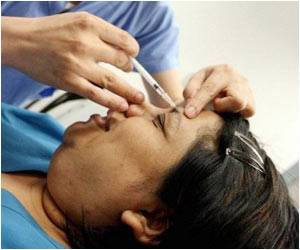Scientists have managed to make old skin in mice young again after just two weeks of treatment by blocking a single gene, according to a study released Thursday.
They did this by creating genetically-modified mice with a defective gene that can be switched off so that their cells ceased to age when a cream was applied to the skin.While still years from being determined safe for use in humans, the discovery offers hope of one day reversing many age-related illnesses and injuries as the technique may work on any kind of organ or tissue.
"Previous work has shown you can reverse aging by really drastic measures" such as a near-starvation diet or "connecting the circulation of a young animal to an old animal," said lead researcher Howard Chang of the Stanford University School of Medicine in California.
"Here we show that aging in mouse skin can be reversed by blocking a single gene," he said.
"These findings suggest that aging is not just a result of wear and tear, but is also the consequence of a continually active genetic program that might be blocked for improving human health."
Chang's team use a complex computer analysis to discover that a single protein is the "shared driving force for the genetic changing associated with aging in lots of different tissues," he said in a telephone interview.
Advertisement
"We even engineered it in such a way that we can actually turn off that defective version in some parts of the animal and not the rest," he explained.
Advertisement
Two weeks later, both the gene expression profile and the tissue characteristics of the treated skin had reverted to that of a young mouse.
While the idea of taking a full-body dip in the fountain of youth might sound like a fantastic idea, there are good reasons to target only specific areas of the body for treatment.
The same gene that stimulates aging, NF-eB, is also involved in the immune system and other cell functions so if it was blocked in the entire body it could cause death, Chang warned.
The next step is to see if blocking the gene will also reverse aging in other tissues such as the heart and lungs.
There is also the question of whether the effect will last if the treatment is continued or if the tissues will rapidly revert back to their previous aged state if the treatment is stopped.
Other researchers are already looking at ways to block the gene in humans using drugs because of its role in the immune system, Chang said.
Further experiments will show if one of those drugs can effectively be used to block the gene in targeted ways for anti-aging purposes.
"What I hope won't happen is a lot of people calling me up to make an appointment to have their face rejuvenated," Chang added.
Even if researchers are able to develop a safe way to use the treatment on humans, there will always be serious risks involved in genetic intervention.
"A lot of people in the field shy away from the fountain of youth and rejuvenation and focus on extracting quality of life," he said.
The study will be the cover story of the December 15 edition of the journal Genes and Development.
Source-AFP
LIN/P






